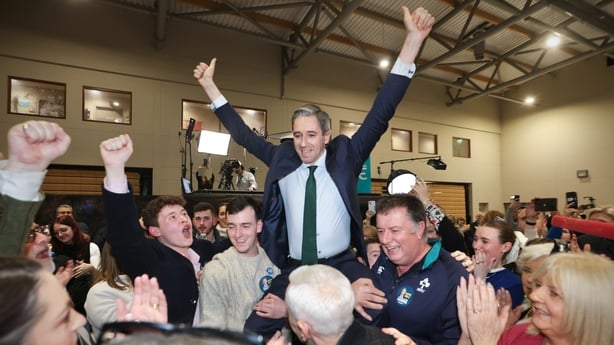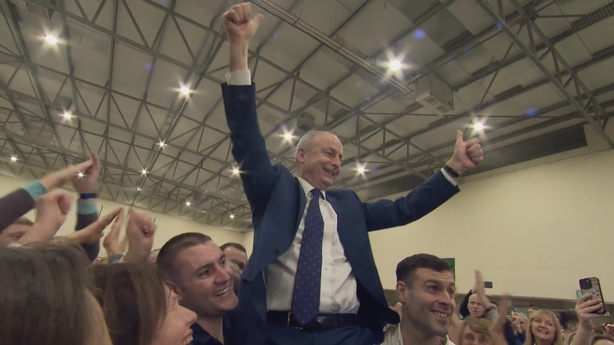Forty-two Dáil seats have been filled in the General Election, with the election of Sinn Féin’s Rose Conway-Walsh in Mayo this morning.
She was elected after the sixth count in the five-seater constituency.
After an exit poll on Friday night, which showed the main three parties are effectively neck-and-neck, there is some way to go before the final picture emerges and the options for government formation crystalise.
Fine Gael leader Simon Harris has dismissed talk of a Sinn Féin surge and said he was “cautiously optimistic” about where his party will stand after all the votes are counted.
Fianna Fáil leader Micheál Martin insisted his party has a “very clear route back to government” as he predicted seat gains.
Sinn Féin leader Mary Lou McDonald told reporters at the RDS count centre in Dublin that she would be “very, very actively pursuing” the potential to form a government with other parties on the left of the political spectrum.
The smaller, left-leaning parties include the Social Democrats, the Labour Party, the Green Party and People Before Profit-Solidarity.
However, the Green Party – the junior partner in the outgoing government – looks set for a bruising set of results.
Green Party leader Roderic O’Gorman is in a fight to hold onto his seat, as are a number of party colleagues, including Minister for Media Catherine Martin.
Friends of the Earth CEO Oisín Coghlan said that the electorate voted against the Greens, he does not believe they were voting against climate action.
He said smaller parties “mostly get the blame for the bits of the government that voters don’t like.”
Speaking on RTÉ Radio, Mr Coghlan said the unfair thing about being a smaller party in government is that everyone claims credit for the good things that happens – such as increased rural transport – and blames them for the unpopular decision – like carbon tax.
The political narrative is that the Green Party are to blame for the carbon tax when the legislation to increase the tax was actually brought in by the last Fine Gael government under Richard Bruton’s climate action plan, he added.
“The Greens looked for a small increase but that’s basically where it came from …. it’s two cent a year on the price of petrol, it’s not what’s caused the huge increase compared to the war in Ukraine.”
Meanwhile, Ms McDonald said her party had delivered an “incredible performance” in the election.
“I think it’s fair to say that we have now confirmed that we have broken the political mould here in this State,” she said last night, adding that “two party politics is now gone. It’s consigned to the dustbin of history and that, in itself, is very significant.”
The counting process could last days because of the voting system of proportional representation with a single transferable vote, where candidates are ranked by preference.
The early indications have turned the focus to the tricky arithmetic of government formation, as the country’s several smaller parties and many independents potentially jockey for a place in government.
In Friday night’s Exit Poll, Sinn Féin was predicted to take 21.1% of first-preference votes, narrowly ahead of outgoing coalition partners Fine Gael and Fianna Fáil at 21% and 19.5% respectively.
Before the election, Fianna Fáil and Fine Gael both ruled out entering government with Sinn Féin.

Mr Harris rejected suggestions that Sinn Féin had broken new ground.
He told reporters at the count centre in Greystones, Co Wicklow: “Certainly we haven’t seen a Sinn Féin surge or anything like it.”
“I mean, it looks likely, on the figures that we’ve seen now, fewer people, many fewer people would have voted Sinn Féin in this election than the last one,” he said.
“In fact, I think they’re down by around 5% and actually the parties, particularly the two parties, the two larger parties in government, are likely to receive significant support from the electorate. So definitely, politics in Ireland has gotten much more fragmented.”
He said it was too early to tell what the next government would look like.
Read more:
Updates as they happen
TDs elected to the 34th Dáil so far
Fianna Fáil and Fine Gael reiterate view to form government
Recap: A look at what happened on day one
Mr Martin told reporters at the Nemo Rangers count centre in Cork, that he was confident that the numbers exist to form a government with parties that shared his political viewpoint.
Mr Martin said it “remains to be seen” whether he would return to the role of taoiseach – a position he held between 2020 and 2022 – but he expressed confidence his party would outperform the Exit Poll prediction.
“It’s a bit too early yet to call the exact type of government that will be formed or the composition of the next government,” he said.

“But I think there are, there will be a sufficiency of seats, it seems to me, that aligns with the core principles that I articulated at the outset of this campaign and throughout the campaign, around the pro-enterprise economy, around a positively pro-European position, a government that will strongly push for home ownership and around parties that are transparently democratic in how they conduct their affairs.”
Asked if it would be in a coalition with Fianna Fáil, Fine Gael and the Social Democrats, he said that would be “racing a bit too far ahead”.
The final result may dictate that if Fianna Fáil and Fine Gael are to return to government, they may need more than one junior partner, or potentially the buy-in of several independent TDs.
Mr Martin said it was unclear how quickly a government can be formed, as he predicted his party would gain new seats.
The early counting also suggested potential trouble for Fianna Fáil in Wicklow, where the party’s only candidate in the constituency, Minister for Health Stephen Donnelly, is considered to have a battle ahead, with the risk of losing his seat.
There is significant focus on Independent candidate Gerard Hutch, also known as ‘The Monk’, who was sitting in fourth place in the four-seat constituency of Dublin Central.
The constituency will be closely watched as other hopefuls wait to see if transfers from eliminated candidates may eventually rule him out of contention.
In the constituency of Louth, the much-criticised selection of John McGahon appeared not to have paid off for Fine Gael.
The party’s campaign was beset by questioning over footage entering the public domain of the candidate engaged in a fight outside a pub in 2018.
The Social Democrats have a strong chance of emerging as the largest of the smaller parties.
The party’s leader, Holly Cairns, was already celebrating before a single vote was counted however, having announced the birth of her baby girl on polling day.
